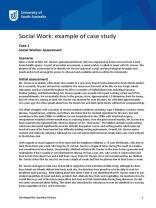What skills are needed to be a social worker?
Becoming a successful social worker requires a combination of essential skills, qualities, and attributes that enable professionals to effectively support individuals and communities in need. Here are some of the key skills and qualities needed to excel in a social work career:
Empathy: Social workers must be empathetic and compassionate, able to understand and connect with the emotions and experiences of their clients.
Active Listening: Effective communication is essential in social work. Active listening involves giving full attention to clients, asking clarifying questions, and showing genuine interest in their concerns.
Communication Skills: Social workers must communicate clearly and effectively, both verbally and in writing, when interacting with clients, colleagues, and other professionals.
Problem-Solving: Social workers help clients navigate complex challenges and develop solutions. Strong problem-solving skills are crucial for identifying and addressing clients' needs.
Cultural Competence: Social workers work with diverse populations, so cultural competence is vital. Understanding and respecting cultural differences and values is essential for building trust and providing culturally sensitive services.
Assessment and Evaluation: Social workers assess clients' needs and evaluate their progress to determine the most appropriate interventions and services.
Case Management: Effective case management involves coordinating services, advocating for clients, and ensuring that clients receive the support they require.
Boundary Setting: Social workers must establish and maintain professional boundaries to ensure ethical and responsible practice.
Advocacy: Advocacy skills are important for representing clients' interests, ensuring their rights are protected, and connecting them with resources and services.
Ethical Decision-Making: Ethical considerations are central to social work practice. Social workers must make ethical decisions that prioritize clients' well-being while adhering to professional standards and codes of ethics.
Resilience: Social work can be emotionally challenging, and professionals must be resilient to cope with stress and adversity while maintaining their effectiveness.
Flexibility: The ability to adapt to changing circumstances and client needs is crucial in social work. Flexibility allows social workers to tailor their services to each individual's unique situation.
Time Management: Social workers often have demanding caseloads and responsibilities. Effective time management ensures that they can meet clients' needs and complete paperwork and documentation in a timely manner.
Teamwork: Social workers collaborate with other professionals, agencies, and organizations to provide comprehensive support to clients. Teamwork and collaboration skills are essential.
Advocacy for Social Justice: Many social workers are passionate advocates for social justice and work to address systemic issues that contribute to social problems.
Mental Health Awareness: Understanding mental health issues and having the ability to recognize signs of mental health challenges in clients is important.
Knowledge of Social Services: A comprehensive understanding of available social services and resources in the community is essential for connecting clients with appropriate assistance.
Continual Learning: Social work is a dynamic field, and ongoing professional development and learning are essential to stay updated on best practices and emerging trends.
Social work is a rewarding but demanding profession that requires a strong commitment to helping others and ongoing self-reflection and growth. Social workers often pursue formal education, such as a bachelor's or master's degree in social work (BSW or MSW), and licensure or certification, depending on their jurisdiction. These educational and experiential requirements vary by location and the specific role within the field.
Essential Skills for Social Work: What You Need to Succeed
Social work is a challenging and rewarding profession that helps people improve their lives and well-being. Social workers work with a wide range of clients, from children and families to the elderly and people with disabilities. They provide a variety of services, including counseling, support groups, case management, and advocacy.
To be successful in social work, it is important to have a strong set of skills. Here are some of the most essential skills for social workers:
- Empathy: Empathy is the ability to understand and share the feelings of another person. It is essential for social workers to be able to empathize with their clients in order to build trust and rapport.
- Communication: Social workers must be able to communicate effectively with their clients, colleagues, and supervisors. They must be able to clearly and concisely convey information, both verbally and in writing.
- Problem-solving: Social workers are often tasked with solving complex problems. They must be able to think critically and creatively to develop solutions that meet the needs of their clients.
- Organization: Social workers must be able to manage their time and workload effectively. They must also be able to keep accurate records and documentation.
- Advocacy: Social workers are advocates for their clients. They must be able to speak up for the rights of their clients and work to ensure that they have access to the resources and services they need.
The Social Worker's Toolkit: Must-Have Skills for the Profession
In addition to the essential skills listed above, social workers also need to have a number of other skills, such as:
- Assessment skills: Social workers must be able to assess the needs of their clients and develop effective intervention plans.
- Intervention skills: Social workers must have a variety of intervention skills, such as counseling, case management, and group work.
- Research skills: Social workers must be able to conduct research to stay up-to-date on the latest trends and practices in social work.
- Cultural competency: Social workers must be culturally competent in order to work effectively with clients from diverse backgrounds.
- Self-care skills: Social work can be a stressful profession, so it is important for social workers to have strong self-care skills. This includes managing stress, maintaining a healthy work-life balance, and seeking support from colleagues and supervisors.
Empathy, Communication, and More: Key Abilities for Effective Social Work
Empathy, communication, and problem-solving are three of the most important skills for social workers.
Empathy allows social workers to connect with their clients on a deeper level and understand their unique experiences. This can help to build trust and rapport, which is essential for effective social work practice.
Communication is essential for social workers to be able to collect information from their clients, develop intervention plans, and collaborate with other professionals. Social workers must be able to communicate effectively both verbally and in writing.
Problem-solving skills are essential for social workers to be able to help their clients overcome challenges and achieve their goals. Social workers must be able to think critically and creatively to develop solutions that are tailored to the individual needs of their clients.
By developing and honing these essential skills, social workers can be more effective in helping their clients and making a positive difference in their lives.










